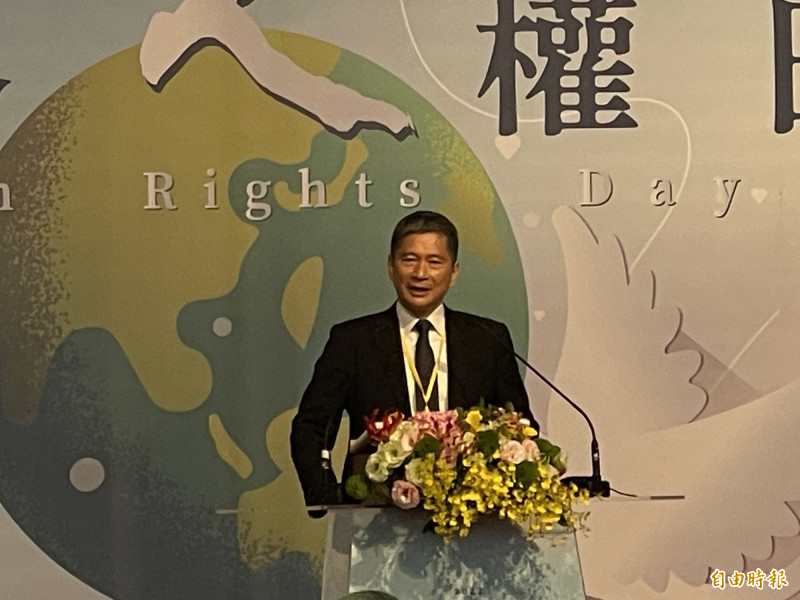Minister of Culture Li Yongde attended the World Human Rights Day ceremony, paid tribute to the predecessors of political victims, and shared the direction of the Ministry of Culture's efforts to promote human rights.
(Photographed by reporter Tu Yingru) [Reporter Tu Yingru/Report from Taipei] The National Human Rights Museum of the Ministry of Culture held the 2022 "World Human Rights Day Ceremony" at the White Terror Jingmei Memorial Park today (10th). Li Jinghui, Deputy Minister of Political Affairs of the Ministry of Foreign Affairs, Hong Shifang, Director of the National Human Rights Museum, and about 200 people who were victims of white terrorism and their families were invited to attend.
Li Yongde, Minister of Culture, said in a speech that today is the annual World Human Rights Day, and the National Human Rights Center will hold such a commemorative conference every year at this time, to pay the price for the predecessors who suffered political persecution in the past and sacrificed their lives, property, and personal freedom. Express the highest respect and gratitude, and take this opportunity to review and reflect on our human rights efforts and future expectations with the world's universal human rights values.
Li Yongde mentioned that President Tsai Ing-wen attaches great importance to human rights. After the Commission for the Promotion of Transitional Justice ceased operations, the human rights work of the country's entire transitional justice has been implemented in every department of the government and continued to work hard. He further shared the three tasks in charge of the Ministry of Culture and results.
First of all, he mentioned "human rights education". He took "Children from Qingshui" written by Cai Kunlin as an example. It just allows children in Taiwan to understand the life stories of their predecessors through comics, and at the same time, through versions in different languages, allows foreigners to understand Taiwan's past history.
Please read on...
The second is "Liu Magou No. 15" produced by Yao Wenzhi, which has received a lot of response recently.
This is the story of the political prisoners on Green Island from the 1950s to the 1960s. Li Yongde mentioned that this movie received a very big response, and the box office reached the expected target, with a box office of nearly 40 million yuan. If we work harder, it is expected to reach 50 million Li Yongde encouraged everyone to go to the cinema to watch the movie.
In addition, he also shared with you director Chen Xinyi's "The Man Who Can't Leave" produced by VR. This film participated in the Venice Film Biennale and won the Venice Film Festival Competition Award. After winning the award in Venice, Chen Xinyi mentioned that this is Taiwan from the 1950s to the The life story of the white terror in the 1960s and 1970s.
This work not only moved our own people in Taiwan, but also received very good reviews internationally because of its universal value.
Regarding the publication of a special book, Li Yongde mentioned that "White Portrait", which was recently written by Lai Xiangyin and won the Golden Award of the National Taiwan Academy of Literature, is also a story about white terror.
He mentioned that there are of course many sad stories in the midst of this white terror, but the process of this life is very moving, and it is also a very important process for Taiwan to enjoy freedom and democracy today, so this is the story of so many predecessors in the past Sacrifice personal life, sacrifice personal freedom, and pay a heavy price, especially worthy of our highest respect once again.
The Ministry of Culture is also in charge of the "Injustice Site". Li Yongde mentioned that he is currently conducting investigations and research. Next year, he will continue to review and identify the "Injustice Site". History is around, and it can generate vigilance at any time, so that the stories of the predecessors can continue to be passed down.
In addition, the Ministry of Culture is also in charge of "oral history". Oral history and archives research have been transferred from the Promotion Association to the Ministry of Culture. History is also the most basic story of the entire life story, and with the oral history, many different forms of human rights education models can be developed in the future.”
☆Art news never misses, click like to follow fan page.
☆For more important news about arts and culture, please go to Free Arts and Culture Network.
